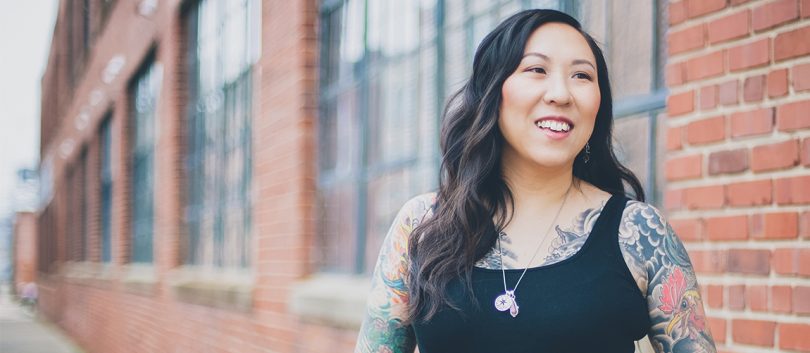When Roberta Zelenko looks at herself in the mirror without a shirt on, she doesn’t see cancer’s scars anymore. She sees two breasts that look just like her old ones—the breasts she lost in a double mastectomy in 2012—thanks to two very special tattoos in the middle of each.They are her new nipples and areolas, inked permanently and in painstaking detail by Richmond-based tattoo artist Amy Black. About two years after Zelenko’s surgery and breast reconstruction, Black worked from pre-operative pictures of her breasts to help make her feel whole again.
“I thought I was OK without them, but I can’t believe how powerful it is to just see myself again, to feel healed,” says Zelenko, 55. “I can change clothes at the YMCA and people don’t even notice. They look so real.” She also shows her tattoos to other women about how to undergo mastectomies, who can’t imagine what their bodies will look like afterward:
That unknown is so scary. When they see me and my body, I see this little look of hope in their eyes, like, ‘Oh, it’s going to be OK.’”
Since 2011, Black has worked with hundreds of women who have had cancer or had their breasts removed after testing positive for a gene that raises the risk of the disease. Using complex layers of colors, mostly pinks, reds and browns, she creates textured, three-dimensional images to match a woman’s remaining breast or put a finishing touch on reconstructed breasts. Each tattoo takes an average 30 to 45 minutes; she does about one or two a month.
The work gives Black both joy and a healthy perspective on life. “It teaches me to appreciate everything,” she says. “When I see what others’ sufferings are, any troubles I have are very unimportant. I lead a very blessed life with good health. I thank everything every day for it.”
Helping as Many as She Can
Black does mastectomy tattoos at her studio in the Carytown section of Richmond, Virginia, or at a local plastic surgery office. Medical insurance doesn’t always cover the $250 per-breast charge, so she has created the nonprofit Pink Ink Fund to offset fees and travel expenses and educate more patients and doctors about mastectomy tattoos. Since military insurance generally doesn’t absorb the cost, she also offers a 20 percent military discount. And with women calling her from across the country and even abroad, Black says she’s willing to travel worldwide.
Each client comes to Black with different needs. Women share what they’d like in terms of nipple shape, size and color via in-person, phone or email interviews; they can choose if they want to share preoperative photos. On appointment days, many bring a family member or friend for support. Some like to talk as Black works—about life, family, cancer, or anything but cancer—and some are quiet. Some laugh. Some cry. Many do both. Black doesn’t get nervous, but she does have to keep her energy levels high. “To give them the service and results they deserve, I have to make sure I am healthy, well-rested and focused,” she says. “It’s really not challenging, but I do sacrifice a lot of personal, social time outside of work to make sure I get enough rest and down time to decompress to be fully energized for everyone.”
Women who have mastectomies have several options for preserving or recreating their nipples. Some qualify for nipple-sparing surgery, but nipples can lose sensation due to nerve damage and may become deformed over time if their blood supply is disrupted. Others choose custom-made prostheses or undergo nipple reconstruction surgery, an outpatient procedure using their own tissue or donor skin products, which is usually done after reconstructed breasts have had several months to heal.
For many cancer survivors, though, the thought of another surgery or medical procedure isn’t appealing. Lisa Jones, a 41-year-old Chesapeake, Virginia, resident diagnosed with invasive ductal carcinoma in August 2014, knew she wanted tattoos rather than nipple reconstruction as soon as she saw online videos of artists at work. “It looked simple, but the 3-D results were just amazing,” she says.
With a friend by her side, Jones had her reconstructed breasts tattooed by Black the following June. “I just wanted to look normal again—not blank,” she says. “After Amy did the first one, I went to the restroom to look in the mirror. I couldn’t believe it. I was so happy.” The first tattoo didn’t hurt; when the second did, Black used a numbing cream to ease the pain. After two weeks of care with antibacterial soap, petroleum jelly, lotion and bandages, Jones’ tattoos were fully healed and she was back to her busy life as the working mother of a 3-year-old boy. While her insurance company denied coverage for what it deemed a cosmetic procedure, $500 was a small price to pay for another triumph over cancer, Jones says: “Amy gave me back what was taken from me.”
Combining Art and Wellness
Born in Seoul, Korea, Black, 40, is an adopted child who grew up mainly in Ohio. She graduated from high school at age 16 and studied for two years at the Columbus College of Art & Design, where she specialized in anatomy and figure drawings. Both were natural focuses for someone who once considered a career as a medical illustrator.
After leaving school, Black did some drawing for corporate clients, including Bath & Body Works, Hard Rock Café, Victoria’s Secret and Walt Disney Co., as well as interior design and mural work in private homes. When she relocated to Richmond in 1998, she took an administrative position at a tattoo studio. Interested in the art of ink, Black completed an apprenticeship with one of the artists, began tattooing in 2000 and eventually took over ownership of the studio in 2005.
After seeing the portfolio of a Maryland tattoo artist who works with mastectomy patients, Black had found her calling. “I felt blessed that I had a way to help others,” she says. She plans out details of each tattoo down to tiny skin bumps and veins; if needed, she will schedule several sessions to gradually perfect colors.
Cancer survivors say Black’s efforts have rebuilt their self-confidence and a sense of femininity that some didn’t even realize they were missing. Zelenko, a Richmond resident with two daughters, had declined nipple reconstruction surgery after enduring a double mastectomy, eight grueling rounds of chemotherapy and reconstructive surgeries. She had been diagnosed with triple negative breast cancer, a type that can be aggressive and difficult to treat, after a screening mammogram in January 2012 uncovered a golf-ball sized tumor in her left breast. She had no family history of the disease.
“I didn’t miss having nipples,” Zelenko remembers. “I had an awesome plastic surgeon, and I was just kind of glad I was here—you know, alive.” But during a shift at her job at a J. Crew store, a customer who was also a friend and fellow cancer survivor took her into a fitting room and showed off her nipple tattoos. “I walked out of that fitting room and called Amy,” she says.
In September 2014, Zelenko and her husband, Rich, went in for a hour-long session with Black, which her health insurance agreed to cover. “I have a pretty high tolerance for pain, and I’m not sure I have a lot of sensation in the reconstructed areas,” she notes. “It felt like a little pin prick at first, but then it didn’t feel like anything.” Over the next 10 days, the tattoos gradually lightened in color, scabbed up and healed as expected and turned out even better than she’d hoped.
“I always say, ‘I have a Picasso, but I can’t really show it to anyone,’” she says. She cracks jokes about her new nipples, too: “You don’t care if you’re cold anymore.” Zelenko later returned to Black’s studio to have a snowdrop flower—a symbol of hope—tattooed over the scar from her chemotherapy port.
Spreading the Word
Zelenko and Jones encourage other breast cancer survivors to ask their plastic surgeons about tattoos as they consider reconstructive options, although the number of tattoo artists offering them remains limited. Zelenko shares her story as a volunteer at a Richmond hospital, while Jones hands out Black’s brochures to women in her cancer support group. “A lot of young women are being diagnosed now,” Jones notes. “I feel like so many people could do this and feel better.”
Black just wants to help people enjoy life. She is even more passionate about that goal after a tough year in which she learned a family member had metastatic breast cancer and a good friend died in a motorcycle accident at age 39.
“I say it all the time, but never take your life for granted,” she says. “Enjoy every single moment of it—the good and the bad—and tell the people you care about that you love them every time you can. Our time here is so short, and so many people lose perspective on that.”
No wonder she wants breast cancer survivors to look in the mirror and see themselves again, healthy and strong.
For more information on mastectomy tattoos and The Pink Ink Fund, visit www.amyblacktattoos.com or pinkinkfund.org.


